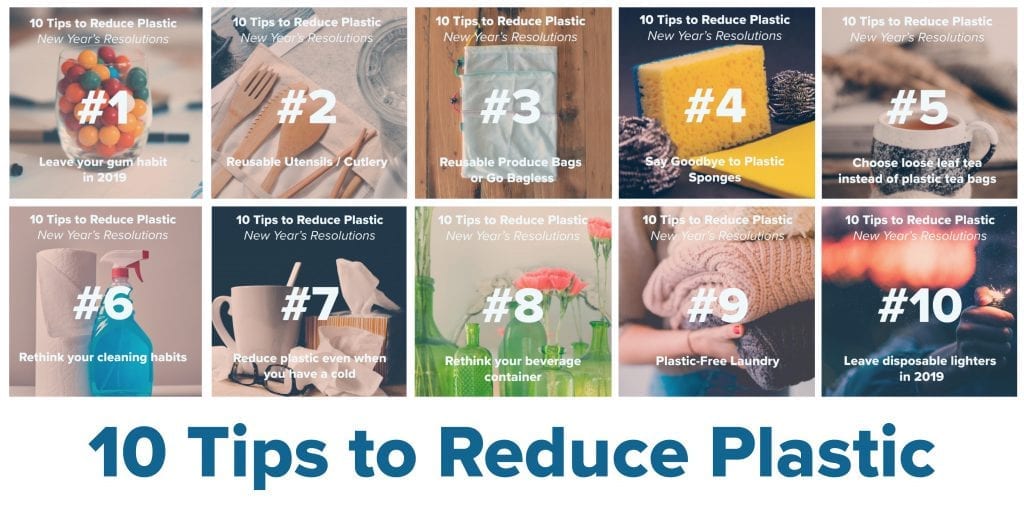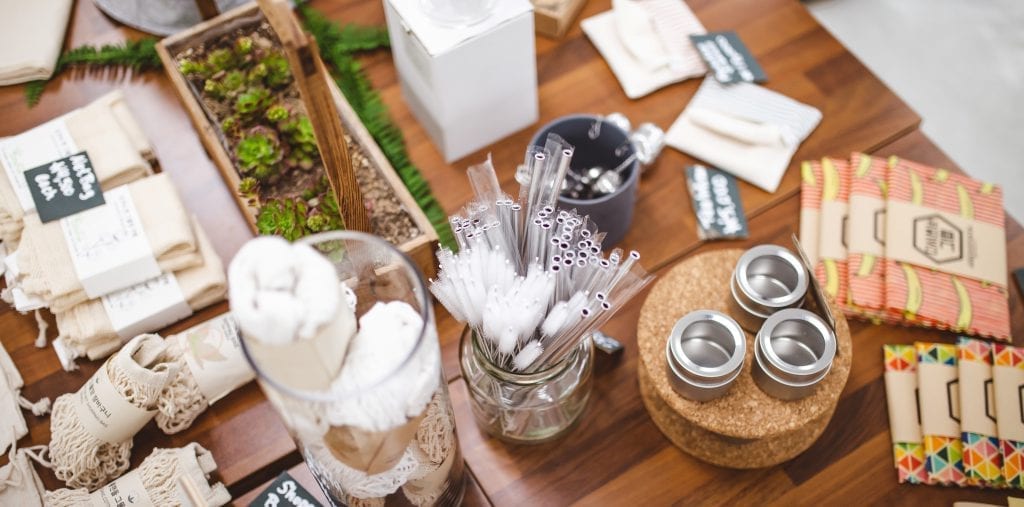
Reducing plastic is hard right? You can swap plastic bottles for reusables but what about all the plastic packaging in the grocery stores? Or all of your necessary products that come in plastic bottles? And sometimes the sustainable alternative is too expensive or too difficult to find.
However, you can’t make a change if you don’t know your options. So next time you contemplate swapping out that plastic detergent bottle, do some research! Did you know that there are detergent sheets that come in a biodegradable, plastic-free package? Forget lugging that bulky, heavy jug from the grocery store, or trying to fit it in your recycling bin!
Here are ten tips to get you started!
1. Ditch your gum habit!
Gum comes in plastic packaging and is also made of plastic. On the other hand, if you cannot ditch your gum habit look for a natural gum options like Simply Gum or Glee Gum. Have a favourite plastic-free gum? Let us know in the comments!
2. Reusable utensils / cutlery
40 billion take-out utensils are produced each year. These single-use items can be a challenge to recycle. Do your part by refusing single-use plastic cutlery. Keep a reusable cutlery set with you to make it an easy choice!
3. Reusable produce bags or go without
We encourage you to use produce bags or shop without bags. The average Canadian uses 700 plastic bags annually – that’s a lot of plastic! Fruit and veggies don’t really need their own bag, but if you want to use one, consider a reusable option!
4. Say goodbye to plastic sponges
Most kitchen sponges are made from plastic and cannot be recycled. Instead of plastic try washable dishcloths or reusable pot scrubbers made of natural materials (wood or bamboo).
5. Choose loose leaf tea instead of plastic tea bags
One cup from a single plastic tea bag could contain 11.6 billion microplastics and 3.1 billion nanoplastic particles. With tea you’re literally adding plastic into the beverage. To avoid drinking plastic opt for loose-leaf tea. It’s better for you and the planet.
6. Rethink your cleaning habits
Paper towel comes wrapped in plastic. Instead use cleaning cloths that can be washed and reused. You can also repurpose old t-shirts as cleaning cloths. Not only is this good for the environment, but it will also save you money!
7. Reduce plastic even when you’re ill
Just like your grandmother used to, instead of reaching for a Kleenex/tissue, try using a kerchief. They can be washed and reused saving you money and reducing your environmental impact. Save the plastic-lined boxes and single-use waste.
8. Rethink your beverage container
When buying your beverages avoid boxed beverages with plastic liners or 6 pack rings around cans. Instead, look for glass and make sure to bring your returnables back to a recycling depot! Glass bottles can also be repurposed as vases or used in other DIY projects!
9. Plastic-free laundry
There are many ways to cut down on plastic in the laundry room. First, ditch your single-use dryer sheets, which are commonly made of polyester (a form of plastic), for dryer balls. Add some essential oils and your clothes will still come out static-free and smelling great. As we mentioned above, consider swapping your plastic detergent jug for detergent sheets.
Lastly, we recommend avoiding the dryer and hanging your clothing to dry when possible. Synthetic clothing breaks down faster in dryers, leading to more microplastics shedding from your clothes.
10. Stop buying disposable lighters
The average lighter is not refillable. Once empty, lighters tend to end up in the garbage as they are hard to recycle. Try using matches or refillable lighters for your needs.
Remember, you don’t have to go 100% zero waste in order to make a difference. Just being conscious of the single-use plastic in your life will help make a difference. Think twice before purchasing it, and consider your alternatives.


Sad that we’re done? Okay fine, here’s one more! 😉
11. Revamp your health & beauty routine
Many beauty products come in plastic packaging which is challenging or impossible to recycle. Try to purchase products in natural or recyclable or reusable containers. Things like shampoo bars often come with no packaging at all!
Okay that’s all. If you have any tips to share we’d love to hear them! Let us know your thoughts in the comments below!
